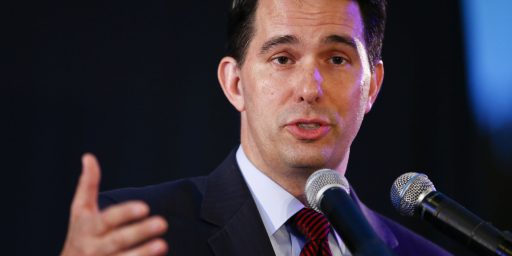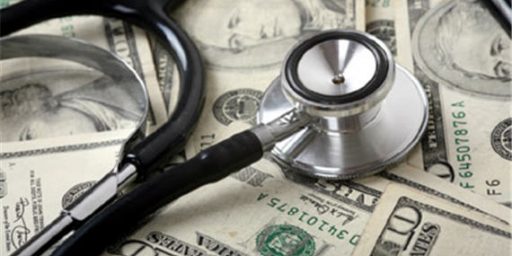Government in the 21st Century
As you must surely know by now for the last two months I’ve been producing daily updates over at my place on the pet food recall which, far from winding down, appears to be about in midstroke. In today’s update, I commented on an LA Times editorial which got me to thinking. The Food and Drug Administration is more than a century old, established to cope with the food and drug safety issues of a century ago. What would a 21st century FDA look like? What problems should it be dealing with? How would it function?
IMO our government, generally, is firmly moored to a 1950’s organizational and performance model. Should this be changed? Can it be changed?
I welcome your ideas and suggestions of approaches and resources. Please leave them in the comments.






One thing we should do is look much closer at things coming from China. Now we see that there may be poisoned toothpaste coming from there.
Yes, I saw that piece when putting together today’s update. China is now the primary (if not the only) vendor for vitamins, flavorings, and food additives. They’ve driven domestic competitors out of business on the basis of cost.
I’ve been pretty critical both of China and those who import from China. I don’t believe that China has the social or legal infrastructure to be a reliable source for food or pharmaceuticals and that, if the required amount of due diligence is done by importers, it’s likely to eat up all of the profits.
Or, most succinctly, shoes from China—good; food from China—not so good.
From Clinton/Gore there has actually been a radical reveral from 50s style regulation. Domestic safety agencies like the FDA and USDA now use more voluntary mechanisms and self-policing then they did during the 50s. These agencies have seen their funding decline or stagnate for the past decade or so.
That’s untrue, Triumph. The FDA, for example, has had its funding increase 10% over the last five years. Perhaps you’d characterize that as stagnant. I wouldn’t.
I would say that they’re not making use of product and process technology the way that private organization have been compelled to do over the last couple of decades.
The problem isn’t solely one of funding. I think that Gammon’s Law has set in—they’re getting progressively fewer outputs relative to inputs.
Dave, I guess it helps to look more closely at the numbers. According to USA Today, from last year’s budget:
Expansion in some niche areas for research, but a decrease in inspection.
Edited to embed long URL. Please use the link tab above the comment composition window to embed links. -ed.
I think that goes directly to my point: the budget is increasing. This is exactly what I meant by a “1950’s model”. Corporations are doing more with less. Why isn’t government?
Note that I’m not opposed to government, I just think that it needs to change with the times and address the problems of today and be a prudent steward of the resources entrusted to it.
Where should the priorities be? Perhaps it’s cynical of me but I suspect that research is a priority rather than inspection because research is more likely to land one a lucrative private job than inspection is.
Can it be changed?
My answer, strictly speaking, is no… there’/s no way to change it. It’s elimination is the only path.
I will take the answer further; there is no way that government of any design can deal with the problems being forced upon it. The issue is not the design of government, it is not the design of the hierarchy within the different governmental fiefdoms , it is not how efficient or inefficient each one of these is , the problem is that government simply cannot handle these tasks. Particularly, government cannot handle these tasks alone. Which is the position that it finds itself in, after generations of governmentally usurping all authority in the field.
And in any event, government cannot guard against these events, strictly from a governmental authority perspective. Our founders, most certainly knew about this problem, and addressed that early on… John Adams, for example:
What we’re dealing with here, in the end, is an over- reliance on government, and a complete disdain for any other kind of control, first from the government, then from the people, particularly the personal variety. Government, supposedly the salvation , the protection against such events, is instead the proximate cause of these things. Not because they were not doing their job; they’re simply doing what governments do. Being big, cumbersome, and power grabbing , and ultimately more interested in the maintenance of itself, rather than its original task. That being service of the people. So it always has been, so it always shall be. and the people, meanwhile, because the government has gotten so big figure what that is personal responsibility for? Why should I have to be concerned about my fellow man, the government will take care of it.
So how is it that so little of that kind of abuse of the food chain for example, happens here in the west? Culture, mostly. Here in the west, because of cultural influence more than anything else, we have people actually give a crap. But don’t worry, our government is slowly taking care of that problem, too.
Given general 2-4% increase in labor cost a 10%
budget increase over 5 years is at best stagnant in real terms and more likely a significant cut in real terms.
Improvements in technology and sampling technology should allow FDA inspectors some productivity gains, but I’ve never looked into the questions. I know some government agencies like the FAA have achieved productivity gains that would put almost every private firm in the country to shame. So government can improve.
What we have is a system that for a very long term has been adequate at what it does — inspect food processed through an established processing system. So now the old system is being changed as imports are now becoming a significant part of the food processing system — and not just from China either. But since there has not been a crises, until possibly now, there has been no demand for change. So the question becomes how do you create a demand for change? You have to make it a political issue that the press will attack politicians on.
I doubt it is something the Republicans can do because their strategy is to prove government incompetent — and George Bush has done a great job of that — not improve it. In the case of the FAA the improvements happened because the private industry dependent on the government bureaucracy demanded it. So out of their own self interest the domestic food industry should be pushing for change. But so far they seem to be looking at this as an exception and not a sign of emerging problems so they are not pushing for change. But if we continue to have problems that will change.